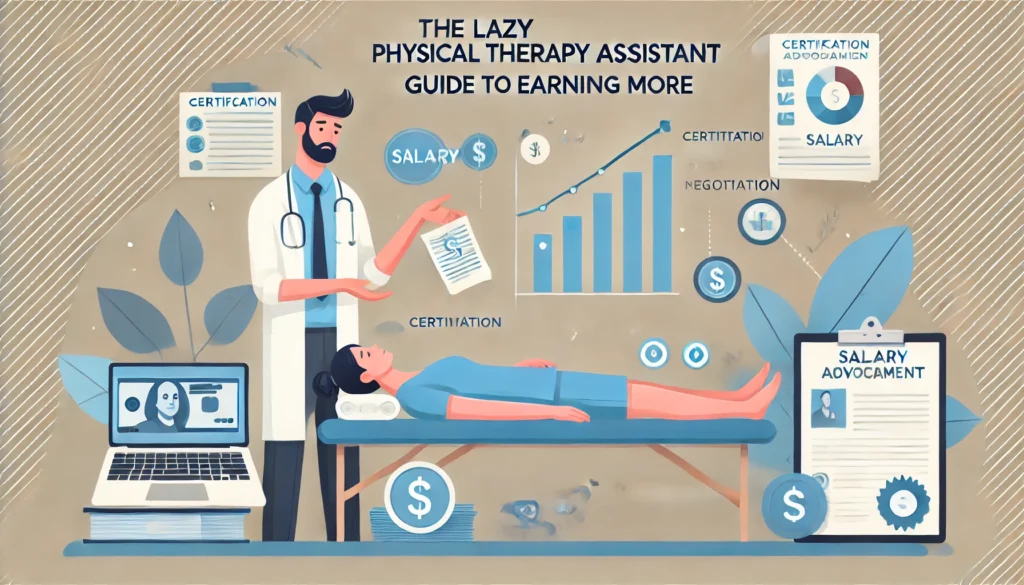Are you a Physical Therapy Assistant (PTA) looking to Raise your PTA salary without drastically changing your daily routine? The good news is that you can implement several simple yet effective strategies to increase your earning potential. Whether you’re just starting your career or are an experienced PTA, obtaining specialized certifications, gaining diverse work experience, and honing negotiation skills can all help elevate your salary. This guide will explore practical ways to Raise your PTA salary, offering you the tools and insights to unlock higher-paying job opportunities and career advancement.
How to Raise Your Physical Therapy Assistant Salary
1. Pursue PTA Certification and Specializations
Obtaining your PTA certification is just the beginning. Specializing in certain areas of physical therapy can make you more valuable to employers and open up higher-paying job opportunities. Consider certifications in:
- Geriatrics: Work with the aging population, focusing on mobility and functional independence.
- Pediatrics: Help children overcome physical challenges and improve their development.
- Orthopedics: We specialize in treating musculoskeletal injuries and enhancing your appeal in sports and rehabilitation clinics.
- Neurology: Assist patients recovering from neurological conditions like stroke or spinal cord injuries.
By pursuing additional certifications, you enhance your skills and demonstrate your commitment to professional growth, making you a more attractive candidate for higher-paying positions.

2. Raise PTA Salary by Gaining Experience in Diverse Work Settings
Experience is one of the most significant factors influencing your salary as a PTA. Here’s how to gain valuable experience:
- Internships and Clinical Rotations: During your PTA program, seek internships in various settings such as hospitals, outpatient clinics, and rehabilitation facilities.
- Volunteering: If you’re starting your career, consider volunteering in healthcare settings to gain hands-on experience and network with professionals in the field.
- Diverse Job Roles: Try to work in different settings, such as private practices, hospitals, and skilled nursing facilities. Each environment offers unique challenges and experiences that can enhance your resume.
As you build your experience, you may qualify for positions with higher salaries, often reserved for those with extensive backgrounds in specific areas of physical therapy.
3. Raise PTA Salary Through Strategic Salary Negotiation
Negotiating your salary can feel daunting, but it’s an essential skill that can significantly increase your PTA salary. Here are some tips to help you negotiate effectively:
- Do Your Research: Understand the average PTA salary in your region and the specific facility you’re applying to. Websites like the Bureau of Labor Statistics and salary comparison platforms can provide valuable insights.
- Know Your Worth: During negotiations, highlight your certifications, experience, and specialized skills. Clearly communicate the value you bring to the practice.
- Be Prepared to Walk Away: If an offer doesn’t meet your expectations, be ready to consider other opportunities. This mindset can empower you during negotiations (Discover comprehensive salary negotiation strategies tailored to healthcare professionals).

4. Raise PTA Salary: The Importance of Continuous Education in Your Career
The healthcare field constantly evolves, and staying updated on the latest trends, techniques, and technologies is crucial. Consider the following options:
- Attend Workshops and Conferences: Participating in industry events broadens your knowledge and provides networking opportunities that could lead to job offers.
- Online Courses and Webinars: Many organizations offer online training sessions focused on emerging trends in physical therapy. Take advantage of these resources to bolster your skills.
5. Build a Strong Professional Network
Networking is a powerful tool that can open doors to higher-paying job opportunities. Here’s how to build and maintain your professional network:
- Join Professional Associations: Organizations like the American Physical Therapy Association (APTA) provide access to resources, networking events, and job boards.
- Connect on Social Media: Platforms like LinkedIn allow you to connect with other PTAs, physical therapists, and healthcare professionals. Engage with their content and share your insights to establish your presence.
- Attend Local Meetups: Seek local PTA or healthcare meetups to meet professionals in your area. Personal connections can lead to job recommendations and opportunities.
Discover tips on building a strong healthcare network that supports your professional advancement.
6. Raise PTA Salary: Advanced Career Opportunities and Their Impact on Earnings
Consider advancing your career further to increase your earning potential. Options include:
- Physical Therapist (PT): Some PTAs pursue further education to become licensed physical therapists, which generally comes with higher salaries.
- Clinical Supervisor or Manager: With experience, PTAs can move into supervisory roles, overseeing other PTAs and enhancing their management skills (Visit our comprehensive guide to healthcare leadership salaries to learn more about salary expectations and career growth opportunities in healthcare leadership).

Common Mistakes to Avoid
1. Underestimating Your Worth
Many PTAs are hesitant to negotiate their salaries. Remember that you are a trained professional providing essential services. Always advocate for your value.
2. Staying in One Position Too Long
While experience is vital, remaining in the same position for too long without seeking advancement can stagnate salary growth. Therefore, it is important to evaluate your career path and seek growth opportunities regularly.
3. Ignoring Continuing Education
Failing to pursue further education can limit your career options and salary potential. Always look for ways to expand your knowledge and skill set.

FAQ About PTA Salary
1. What is the average salary of a Physical Therapy Assistant?
The average salary for a PTA in the United States is around $58,000 annually, but this can vary significantly based on location, experience, and specialization.
2. How can I become a certified PTA?
To become a certified PTA, you must complete an accredited PTA program and pass the National Physical Therapy Exam (NPTE) for PTAs.
3. Are there online courses available for PTAs?
Many institutions and organizations offer online courses tailored for PTAs looking to expand their skills and knowledge.
4. How can networking help my career as a PTA?
Networking can lead to job opportunities, mentorship, and valuable industry insights that can enhance your career growth.
5. What specializations can I pursue as a PTA?
PTAs can specialize in geriatrics, pediatrics, orthopedics, neurology, and sports rehabilitation.
Key Factors Affecting PTA Salary
| Factor | Impact on Salary |
|---|---|
| PTA Certification | Higher earnings with specialized knowledge |
| Work Experience | Increased pay with years of service and specialized experience |
| Specialization (e.g., Geriatrics, Orthopedics) | Higher demand and pay for specialized skills |
| Work Setting (Hospitals vs. Private Practice) | Different pay scales depending on location and environment |
| Continuing Education & Networking | Access to higher-paying roles and career advancement |
Conclusion: How Raising Your PTA Salary Can Advance Your Career and Increase Earnings
Increasing your PTA salary is achievable with the right strategies and a proactive approach to your career. You can unlock new earning potential by pursuing certifications, gaining diverse experiences, mastering negotiation skills, and continuously educating yourself. Remember, your journey to a higher salary starts with your willingness to invest in yourself and advocate for your value in the healthcare field.







